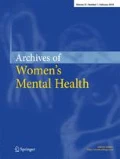Abstract
Many women develop postpartum mental health symptoms, ranging from the maternity blues to clinically diagnosed postpartum depression (PPD). Substantial literature supports an association between depression and type 2 diabetes, but there is limited literature regarding to what extent this relationship pertains to gestational diabetes (GDM) and postpartum depression. Review of the literature regarding GDM and PPD with a particular focus on describing the prevalence of PPD among women who may be at increased risk for GDM, including low-income and ethnic minority groups, was performed. Literature searches were conducted across four databases for studies reporting postpartum mental health outcomes (including postpartum depression, behavioral symptoms, mental disorders, mood, anxiety, quality of life) following a diagnosis of GDM. Studies including subgroups of women with GDM were included if postpartum mental health outcomes were reported. Of the 245 abstracts identified, ten studies were included in the final review. Findings suggest that PPD was high among low-income, ethnic minority women. Additional research is required to understand the complex relationship between GDM and PPD among low-income women, with the ultimate goal of implementing tailored interventions to address their medical and psychiatric needs.

Notes
Recently, the American College of Obstetrics and Gynecology (ACOG) and the US Preventive Services Task Force issued statements supporting screening asymptomatic pregnant women at 24 weeks for GDM with a “B” recommendation, suggesting adequate evidence that benefits associated with earlier screening outweigh potential risks. According to ACOG, early pregnancy screening for undiagnosed DMT2 is also suggested in women with risk factors, including those with a prior history of GDM. If the result of early testing is negative, repeat screening for high-risk women is recommended at 24–28 weeks of gestation. The two-step approach to testing, commonly used in the USA, is based on the first screening with the administration of 50 g of an oral glucose solution followed by a 1-h venous glucose determination. Those individuals meeting or exceeding the screening threshold undergo a 100-g, 3-h diagnostic oral glucose tolerance test (OGTT).
References
Al-Shahrani, M., Al-Sunaidi, M., Al-Amri, H., Al-Maswary, S., & Al-Gelban, K. (2011a). Gestational diabetes and postpartum depression. Arab Journal of Psychiatry, 22(2), 133–137. http://auth.lib.unc.edu/ezproxy_auth.php?url; http://search.ebscohost.com/login.aspx?direct=true&db=psyh&AN=2011-28942-008&site=ehost-live&scope=site
Bardenheier BH, Elixhauser A, Imperatore G, Devlin HM, Kuklina EV, Geiss LS, Correa A (2013) Variation in prevalence of gestational diabetes mellitus among hospital discharges for obstetric delivery across 23 states in the United States. Diabetes Care 36(5):1209–1214. doi:10.2337/dc12-0901
Besser, A., Priel, B., Flett, G. L., & Wiznitzer, A. (2007). Linear and nonlinear models of vulnerability to depression: personality and postpartum depression in a high risk population. Individual Differences Research, 5(1), 1–29. http://auth.lib.unc.edu/ezproxy_auth.php?url; http://search.ebscohost.com/login.aspx?direct=true&db=psyh&AN=2007-04368-001&site=ehost-live&scope=site
Crowther CA, Hiller JE, Moss JR, McPhee AJ, Jeffries WS, Robinson JS, Australian Carbohydrate Intolerance Study in Pregnant Women (ACHOIS) Trial Group (2005) Effect of treatment of gestational diabetes mellitus on pregnancy outcomes. N Engl J Med 352(24):2477–2486. doi:10.1056/NEJMoa042973
Dalfra MG, Nicolucci A, Bisson T, Bonsembiante B, Lapolla A, QLISG (Quality of Life Italian Study Group) (2012) Quality of life in pregnancy and post-partum: a study in diabetic patients. Qual Life Res 21(2):291–298. doi:10.1007/s11136-011-9940-5
Daniells S, Grenyer BF, Davis WS, Coleman KJ, Burgess JA, Moses RG (2003) Gestational diabetes mellitus: is a diagnosis associated with an increase in maternal anxiety and stress in the short and intermediate term? Diabetes care 26(2):385–389
Halkoaho, A., Kavilo, M., Pietilä, A.-M., Huopio, H., Sintonen, H., & Heinonen, S. (2010). Does gestational diabetes affect women’s health-related quality of life after delivery? Eur J Obstet Gynecol Reprod Biol, 148(1), 40–43. http://linkinghub.elsevier.com/retrieve/pii/S0301211509005910
Kim C, Brawarsky P, Jackson RA, Fuentes-Afflick E, Haas JS (2005) Changes in health status experienced by women with gestational diabetes and pregnancy-induced hypertensive disorders. J Womens Health 14(8):729–736. doi:10.1089/jwh.2005.14.729
Kozhimannil KB, Pereira MA, Harlow BL (2009) Association between diabetes and perinatal depression among low-income mothers. JAMA 301(8):842–847. doi:10.1001/jama.2009.201
Liu CH, Tronick E (2012) Rates and predictors of postpartum depression by race and ethnicity: results from the 2004 to 2007 New York City PRAMS survey (Pregnancy Risk Assessment Monitoring System). Matern Child Health J. doi:10.1007/s10995-012-1171-z
Sjögren B, Robeus N, Hansson U (1994) Gestational diabetes: a case–control study of women’s experience of pregnancy, health and the child. J Psychosom Res 38:815–822
Vernon, M. M., Young-Hyman, D., & Looney, S. W. (2010). Maternal stress, physical activity, and body mass index during new mothers’ first year postpartum. Women Health, 50(6), 544–562. http://www.ncbi.nlm.nih.gov/pubmed/20981636
Acknowledgments
This project was supported by National Institute on Minority Health and Health Disparities (NIMHD) of the National Institutes of Health under Award Number P60MD006902.
Author information
Authors and Affiliations
Corresponding author
Rights and permissions
About this article
Cite this article
Barakat, S., Martinez, D., Thomas, M. et al. What do we know about gestational diabetes mellitus and risk for postpartum depression among ethnically diverse low-income women in the USA?. Arch Womens Ment Health 17, 587–592 (2014). https://doi.org/10.1007/s00737-014-0460-5
Received:
Accepted:
Published:
Issue Date:
DOI: https://doi.org/10.1007/s00737-014-0460-5

